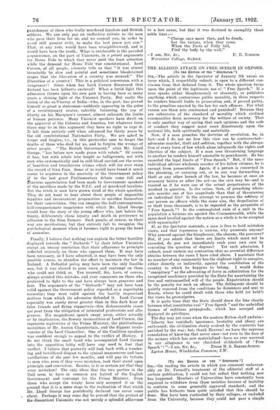THE ALLEGED ATTACK ON FREE SPEECH IN OXFORD. [To THE
EDITOR OP THE " SPECTATOR."] SIR,—The article in the Spectator of January 7th raises an issue which, I respectfully submit, is open to a different con-
clusion from that deduced from it. The whole question turns upon the point of the legitimate use of " Free Speech." If a man speaks either blasphemously or obscenely, or publishes anything which contravenes public morality, in these respects he renders himself liable to prosecution and, if proved guilty, to the penalties exacted by the law for such offences. For what reason are these acts condemned and punished? Because they are subversive of the standard of morality which civilized communities deem necessary for the welfare of society. That is only another way of saying that such opinions and the code of conduct they suggest must react disastrously upon the national life, both spiritually and materially.
Now, if a man preaches the doctrine of revolution, he, in fact—and I do not see how this view can be controverted—
advocates murder, theft and sedition, together with the abroga- tion of every form of law which alone safeguards the rights and liberties of the subject. If a man uses threatening language to another he renders himself amenable to punishment. He has exceeded the legal limits of " Free Speech." But, if the same individual advises wholesale murder of his fellow citizens, he is exempt from prosecution. Again, if a person is concerned. in the planning, or carrying out, or in any way forwarding a theft or any other breach of the law, he becomes at once an accessory before or after the act—as the case may be—and is treated as if he were one of the actual perpetrators of the misdeed in question. Is the crime, then, of preaching whole- sale murder one of less magnitude than that of threatening an individual life? Is the attempt to procure the robbery of one person an offence while the same aim, the despoliation of or theft from thousands, is to be regarded as the perquisite of " Free Speech "? Is the contemplated ruin of a unit in the population a heinous sin against the.Commonwealth. while the same deed levelled against the nation as a whole is to be accepted with equanimity?
If, as the Spectator contends, a man is free to hold mistaken views, and that repression is unwise, why prosecute anyone?
Why proceed against the blasphemer, the obscene, the procurer?
But, if you admit that there are limits which must not be exceeded, do you not immediately crab your own case by conceding the question of degrees? Yet such admission, I submit, must sustain my contention that no essential difference obtains between the cases I have cited above. I maintain that no member of any community has the slightest right to conspire,
either directly or indirectly, against the constitution of the country to which he happens to belong. I would define
"conspiracy" as the advocating of force in substitution for the recognized machinery provided by the State for ascertaining the free and untrammelled will of the people. Expatriation should be the penalty for such an offence. The delinquent should be quietly removed from the conditions he denounces and sent to Russia, where he could dwell with those who hold (or held?) the views he promulgates.
It is quite time that the State should draw the line clearly between what constitutes real " Free Speech " and the unbridled licence of seditious propaganda, which has usurped and depraved its privileges.
The day may yet come when the modern Briton shall exclaim : " Liberty has vanished; ignorance, brutality and idiocy are enthroned; the civilization slowly evolved by the centuries has perished- by the way; but, thank Heaven! we have the supreme consolation of knowing that never once—not even in the face of the menace which has now materialized—have we ever wavered in our allegiance to our cherished shibboleth of ` Free


































 Previous page
Previous page